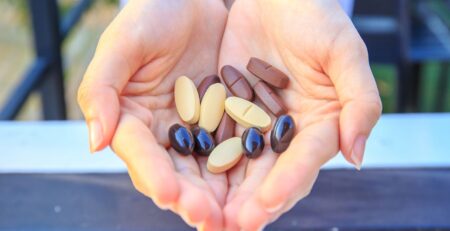Unlock the Secrets: Vitamins that Can Help You Achieve Your Weight Loss Goals
Losing weight can be challenging, but you can do it with the right approach and tools. One often overlooked aspect of weight loss is the role of vitamins.
Specific vitamins and minerals are crucial in helping our bodies burn fat and keep our metabolism running smoothly. This article will delve into the vitamins that can help you achieve your weight loss goals and how to incorporate them into your diet.
Which Vitamins Help With Weight Loss?
Several vitamins may aid in weight loss.
- Vitamin B12 is necessary for fat and protein metabolism and may help boost energy levels.
- Vitamin D regulates the body’s metabolism and may help with weight loss by increasing muscle mass.
However, weight loss is primarily achieved through a healthy diet and regular exercise. These vitamins should be used in addition to these lifestyle changes, not as a substitute.
How Does Vitamin B Help Weight Loss?
Vitamins B, particularly Vitamin B12, can play a role in weight loss by helping to regulate the metabolism and boost energy levels.
Vitamin B12 helps the body convert food into energy by playing a role in fat and protein metabolism. When the body lacks sufficient B12, the metabolism can slow down, making it more difficult to lose weight. B12 can also boost energy levels, which can help to increase physical activity and lead to weight loss.
Additionally, Vitamin B6 is known to be involved in synthesizing neurotransmitters and chemical messengers in the brain. The neurotransmitters play a role in regulating appetite, so adequate intake of Vitamin B6 can help to control hunger and cravings, leading to weight loss.
How Does Vitamin D Help Weight Loss?
Vitamin D regulates the body’s metabolism and may help with weight loss by increasing muscle mass.
Vitamin D helps the body absorb calcium, which is necessary to maintain healthy bones. It also helps to regulate the immune system and insulin production. Low levels of vitamin D have been linked to obesity and weight gain, and research has shown that individuals with higher levels of vitamin D tend to have a lower body mass index (BMI).
Vitamin D may also impact weight loss by increasing muscle mass. Low vitamin D levels have been associated with muscle weakness and muscle wasting, which can affect physical activity and lead to weight gain. Adequate vitamin D intake can help maintain muscle mass, boost metabolism, and aid in weight loss.
What Supplements Should You Take When Losing Weight?
Focusing on a healthy diet and regular exercise is essential to losing weight. However, certain supplements may aid in weight loss by helping to regulate metabolism, control blood sugar levels, and curb cravings.
Here are some supplements that may aid in weight loss:
- Protein powders: Protein can help to increase feelings of fullness, reduce cravings, and promote muscle growth.
- Fiber supplements: Fiber can help to increase feelings of fullness and promote healthy digestion.
- Green tea extract: Green tea contains antioxidants and caffeine, which may boost metabolism and increase fat burning.
- Conjugated linoleic acid (CLA): CLA is a type of fatty acid that has been shown to reduce body fat and increase muscle mass.
- Omega-3 fatty acids: Omega-3s may help to reduce inflammation and decrease body fat.
How Do You Speed Up Weight Loss?
Increase physical activity: Regular exercises, such as cardio and strength training, can help to burn calories, boost metabolism, and increase muscle mass.
Reduce calorie intake: Creating a calorie deficit by consuming fewer calories than your body burns is a critical factor in weight loss.
Eat more protein: Protein can help to increase feelings of fullness, reduce cravings, and promote muscle growth.
Drink more water: Drinking water can help to reduce appetite and increase feelings of fullness.
Get enough sleep: Adequate sleep is important for weight loss as it can help regulate hormones that control appetite and metabolism.
Try Intermittent fasting: Intermittent fasting involves alternating periods of eating with periods of fasting and has been shown to promote weight loss by reducing overall calorie intake and increasing insulin sensitivity.
Avoid processed foods, added sugar, and saturated fats: These foods are often high in calories and low in nutrients, making it difficult to lose weight.
Is There any Drug for Weight Loss?

Yes, there are prescription drugs that can aid in weight loss. Ozempic, Wegovy, and Saxenda are all FDA-approved drugs designed to help people lose weight.
Ozempic For Weight Loss
Ozempic (semaglutide) is a once-weekly injectable medication that belongs to a class of drugs called GLP-1 receptor agonists. It works by mimicking the action of a hormone called GLP-1, which is naturally produced by the body to regulate appetite and insulin production.
When Ozempic binds to GLP-1 receptors in the brain and gut, it increases feelings of fullness and reduces appetite, which can lead to weight loss. It also slows down the emptying of the stomach, which can prolong feelings of fullness. Additionally, it helps the body produce more insulin and uses it more efficiently, leading to lower blood sugar levels and weight loss.
Ozempic is intended for use with a reduced-calorie diet and regular physical activity and should not be used as a substitute for these lifestyle changes. It should only be used under the guidance and supervision of a healthcare professional and is intended for people with a BMI of 30 or more or people with a BMI of 27 or more who also have weight-related health conditions such as diabetes or high blood pressure.
Wegovy For Weight Loss
Wegovy is indicated as an adjunct to diet and exercise to improve glycemic control in adults with type 2 diabetes who have inadequately controlled blood sugar levels with other oral diabetes medications.
It is also used as an adjunct to diet and exercise to help people with obesity who have a body mass index (BMI) of 30 or more or who have a BMI of 27 or more and at least one weight-related comorbidity.
Final Words
Incorporating the right vitamins into your diet can significantly impact your weight loss journey. From increasing metabolism to suppressing appetite, these essential nutrients can give you the boost you need to reach your goals.
However, it’s important to remember that vitamins alone aren’t enough for weight loss; a healthy diet and regular exercise are also crucial components. If you’re thinking about adding vitamins to your weight loss plan, consult a healthcare professional to determine which ones are right for you. With the right approach, you’ll be well on achieving your desired results.












Leave a Reply